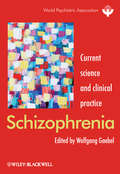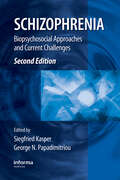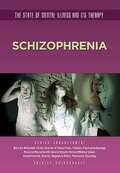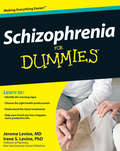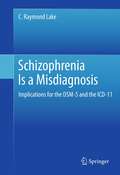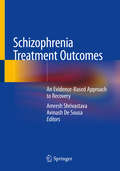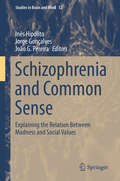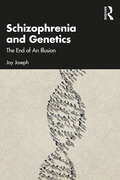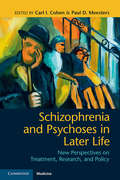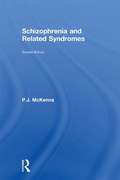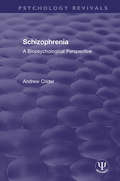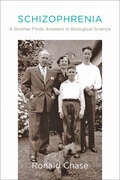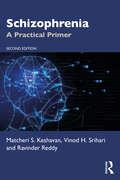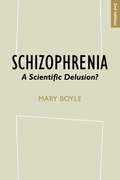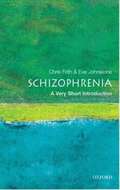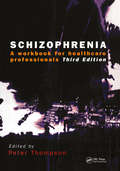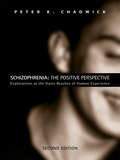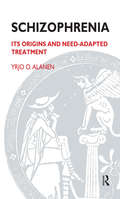- Table View
- List View
Schizophrenia
by Wolfgang GaebelThe first book in a new series from the World Psychiatric Association, Schizophrenia: current science and clinical practice presents recent information on the diagnosis, neurobiological foundations, and management of schizophrenia. It evaluates the findings obtained with modern techniques like magnetic resonance imaging, genetics and network analyses. The book reviews the importance of neurocognitive functioning in schizophrenia and its predictive value for functional capacity. It covers the key areas of early recognition, prevention, rehabilitation and stigma. There is also a critical discussion of diagnostic classification and the revision of the two major international systems. Written by experts in the field who have a track record of being engaging authors, this book provides a rapid overview of the current state of the art in schizophrenia research and clinical management. It will be invaluable to all psychiatrists, psychologists, neuropharmacologists, researchers in psychiatry and psychopharmacology in academia and in industry, and clinical and behavioural neuroscientists.
Schizophrenia (Clinical Psychology: A Modular Course)
by Chris Jackson Max BirchwoodSchizophrenia continues to be the most debilitating of the psychotic disorders with less than one third returning to a 'normal' level of functioning. Our understanding of this disorder has advanced considerably over the last 10 years with major contributions from neurobiology but particularly from an understanding of the way in which psychosocial and psychological factors interact with underlying vulnerabilities to influence both the content and timing of psychotic symptoms and the personal and social difficulty they create. This book brings together this disparate and complex literature in a highly accessible and up-to-date way. It is written by two leading academic-clinical psychologists in the area who uniquely bring together an understanding of key scientific concepts with clinical reality. The section on treatment brings to the reader a clear account of psychological, social and drug treatments interspersed with clinical accounts. The text is aimed primarily at undergraduates attempting to gain some understanding of this exciting and rapidly developing field but with sufficient depth to engage the trainee clinical psychologist, community psychiatric nurse, and psychiatrist.
Schizophrenia (Medical Psychiatry Series)
by Bernard Fried Bernard ShermaEdited by the president of the World Federation of Societies of Biological Psychiatry and featuring an international list of world-renown contributors, Schizophrenia, Second Edition provides psychiatrists, neurologists, and psychologists with a comprehensive handbook on the latest schizophrenia research and management from diagnosis through tr
Schizophrenia (The State of Mental Illness and Its Ther)
by Shirley BrinkerhoffSchizophrenia, the most severe of the mental disorders, usually begins in late adolescence or young adulthood. A patient's first symptoms may be hallucinations, such as hearing voices that sound as real as those of friends and family. Or they may be delusions, such as believing that aliens are sending information to him via the radio or through television programs. While the mysterious disease can have devastating effects on the one percent of the population who experience it, new antipsychotic drugs now offer more hope for effective treatment than at any other time in history. Schizophrenia explains how the human brain operates, and how antipsychotic drugs work inside the brain in order to help relieve the symptoms of this mental disorder. In this book, you will read about: *The Nobel Prize-winning mathematician who battled schizophrenia for several decades. *The university student who dedicated his life to researching schizophrenia after his own sister was diagnosed with the disease at the age of seventeen. *The four sisters--identical quadruplets--who each had schizophrenia, and who allowed the National Institute of Mental Health to study their disease over the course of many decades. *The famous guitarist in a British rock band whose drug use propelled him into schizophrenia. Let their stories teach you about the struggles, challenges, and hopes of people with this disease.
Schizophrenia For Dummies
by Irene S. Levine Jerome LevinePractical tools for leading a happy, productive lifeSchizophrenia is a chronic, severe, and disabling mental disorder that afflicts one percent of the population, an estimated 2.5 million people in America alone. The firsthand advice in this reassuring guide will empower the families and caregivers of schizophrenia patients to take charge, offering expert advice on identifying the warning signs, choosing the right health professional, understanding currently available drugs and those on the horizon (as well as their side effects), and evaluating traditional and alternative therapies.
Schizophrenia Is a Misdiagnosis
by C. Raymond LakeSchizophrenia is the most widely known and feared mental illness worldwide, yet a rapidly growing literature from a broad spectrum of basic and clinical disciplines, especially epidemiology and molecular genetics, suggests that schizophrenia is the same condition as a psychotic bipolar disorder and does not exist as a separate disease. The goal is to document and interpret these data to justify eliminating the diagnosis of schizophrenia from the nomenclature. The author reviews the changing diagnostic concepts of schizophrenia and bipolar disorder with a historical perspective to clarify how the current conflict over explanations for psychosis has arisen. That two disorders, schizophrenia and bipolar, known as the Kraepelinian dichotomy, account for the functional psychoses has been a cornerstone of Psychiatry for over 100 years, but is questioned because of substantial similarities and overlap between these two disorders. Literature in the field demonstrates that psychotic patients are frequently misdiagnosed as suffering from the disease called schizophrenia when they suffer from a psychotic mood disorder. Such patients, their families, and their caretakers suffer significant disadvantages from the misdiagnosis. Psychotic patients misdiagnosed with schizophrenia receive substandard care regarding their medications, thus allowing their bipolar conditions to worsen. Other adverse effects are substantial and will be included. Liability for medical malpractice is of critical importance for the mental health professionals who make the majority of the diagnoses of schizophrenia. The concept put forward in this work will have a discipline-altering impact.
Schizophrenia Treatment Outcomes: An Evidence-Based Approach to Recovery
by Avinash De Sousa Amresh ShrivastavaThis book analyzes schizophrenia management in the context of recent clinical therapeutic advances that have transformed the measurements and outcomes landscape. Unlike any other resource, this volume carefully develops the social and clinical guidelines that affect the life of the patient and defines its role in schizophrenia treatment outcomes. The text begins by determining the concepts, development, neuroscience, and guidelines for positive outcomes before analyzing the gaps in the literature. The text addresses medical concerns in relation to outcomes in schizophrenic patients, including substance use, impact from antipsychotic medications, and medical comorbidities. The text also covers external determinants that may inhibit positive outcomes, including cultural factors, stigma, and environmental issues. Written by experts in schizophrenia care, this book compiles sound research, current clinical trends, and modern measurement markers into a well-organized compendium that delivers this data into a practical guide for measuring treatment outcomes in patients suffering from the disease.Schizophrenia Treatment Outcomes is the ultimate guide for psychiatrists, psychologists, nurses, social workers, and all medical practitioners interested in improving outcomes for schizophrenia patients.
Schizophrenia and Common Sense: Explaining the Relation Between Madness and Social Values (Studies in Brain and Mind #12)
by Inês Hipólito Jorge Gonçalves João G. PereiraThis book explores the relationship between schizophrenia and common sense. It approaches this theme from a multidisciplinary perspective. Coverage features contributions from phenomenology, cognitive neuroscience, philosophy of mind, psychology, and social cognition. The contributors address the following questions: How relevant is the loss of common sense in schizophrenia? How can the study of schizophrenia contribute to the study of common sense? How to understand and explain this loss of common sense? They also consider: What is the relationship of practical reasoning and logical formal reasoning with schizophrenia? What is the relationship between the person with a diagnosis of schizophrenia and social values? Chapters examine such issues as rationality, emotions, self, and delusion. In addition, one looks at brain structure and neurotransmission. Others explore phenomenological and Wittgensteinian theories. The book features papers from the Schizophrenia and Common Sense International Workshop, held at New University of Lisbon, November 2015. It offers new insights into this topic and will appeal to researchers, students, as well as interested general readers.
Schizophrenia and Genetics: The End of An Illusion
by Jay JosephSchizophrenia is a widely investigated psychiatric condition, and though there have been claims of gene "associations," decades of molecular genetic studies have failed to produce confirmed causative genes. In this book, Joseph focuses on the methodological shortcomings of schizophrenia genetic research. His findings have major implications not only on how we understand the causes of schizophrenia and other psychiatric conditions, but also on how we understand the causes of human behavior in general. Chapters explore the differing theoretical concepts of schizophrenia, molecular genetic research around schizophrenia, family, twin, and adoption studies, and non-medical prevention and intervention strategies. Prominent researchers and studies in the field are discussed and critiqued comprehensively throughout. This book is essential reading for psychiatrists, psychologists, behavioral scientists, and anyone interested in the causes of human behavior.
Schizophrenia and Psychoses in Later Life: New Perspectives on Treatment, Research, and Policy
by Carl I. Cohen Paul D. MeestersBy 2050, the number of people aged sixty years and older with schizophrenia is expected to double and affect about 10 million people worldwide. Psychoses are among the most common experiences in later life, with a lifetime risk of 23 percent. As a result, there is a looming crisis in mental health care. Schizophrenia and Psychoses in Later Life is the first major multidisciplinary reference on these important disorders. The book provides guidelines for clinical care, research and policy that are consistent with the emerging paradigmatic changes occurring with respect to schizophrenia in later life. This book features multidisciplinary contributions from experts in the fields of biological psychiatry, social psychiatry, sociology, anthropology, social work, psychology, and neuropsychology that will help professionals to integrate services and attain the best outcomes. The text will guide psychiatrists, psychologists, gerontologists, policymakers, and social scientists in creating innovative new programs to help this underserved and growing population.
Schizophrenia and Related Syndromes
by P. J. McKennaThis new edition of Schizophrenia and Related Syndromes has been thoroughly updated and revised to provide an authoritative overview of the subject, including new chapters on the neurodevelopmental hypothesis, cognitive neuropsychology, and schizophrenia and personality. Peter McKenna guides the reader through a vast amount of literature on schizophrenia plus related syndromes such as paranoia and schizoaffective disorder, providing detailed and in-depth, but highly readable, accounts of the key areas of research. The book describes the clinical features of schizophrenia and its causes and treatment, covering subjects such as: Aetiological factors in schizophrenia The neurodevelopmental theory of schizophrenia Neuroleptic drug treatment Paraphrenia and paranoia Childhood schizophrenia, autism and Asperger's syndrome Schizophrenia and Related Syndromes will prove invaluable for psychiatrists and clinical psychologists in training and in practice. It will also be a useful guide for mental health professionals and researchers working in related fields.
Schizophrenia: A Biopsychological Perspective (Psychology Revivals)
by Andrew CriderOriginally published in 1979, this introductory text approaches schizophrenia as a complex biopsychological condition. Drawing from the fields of descriptive psychiatry, psychopathology, neurochemistry, genetics, life history research, and institutional practice, the author details our increasing understanding of the nature and etiology of schizophrenia at the time. He organizes and evaluates current concepts and findings from these areas, with a view towards integration. This volume was intended to serve as an introduction for advanced undergraduate and graduate students in psychology, as well as for students in psychiatry, psychiatric nursing, and clinical social work. The author assumes that a comprehensive understanding of schizophrenia requires a synthesis of findings from diverse fields and emphasizes the compatibility of, and points of contact between, clinical psychological, and biological approaches. Here is a text that introduces the reader to this challenging subject and to contributions from a variety of allied disciplines. Today it can be read in its historical context.
Schizophrenia: A Brother Finds Answers in Biological Science
by Ronald ChaseA neuroscientist explores the biological bases of schizophrenia and tells the heartbreaking story of his own brother’s battle with the disease.Honorable Mention for the AMWA Medical Book Awards of the American Medical Writers AssociationWhen bright lives are derailed by schizophrenia, bewildered and anxious families struggle to help, and to cope, even as scientists search for causes and treatments that prove elusive. Painful and often misunderstood, schizophrenia profoundly affects people who have the disease and their loved ones. Here Ronald Chase, an accomplished biologist, sets out to discover the facts about the disease and better understand what happened to his older brother, Jim, who developed schizophrenia as a young adult.Chase’s account alternates between a fiercely loyal and honest memoir and rigorous scientific exploration. He finds scientific answers to deeply personal questions about the course of his brother’s illness. He describes psychiatric practice from the 1950s—when electroconvulsive shock therapy was common and the use of antipsychotic medications was in its infancy—to the development of newer treatments in the 1990s. Current medical and scientific research increases our understanding of genetic and environmental causes of the disease.Chase also explores the stigma of mental illness, the evolution of schizophrenia, the paradox of its persistence despite low reproduction rates in persons with the disease, and the human stories behind death statistics. With the author’s intimate knowledge of the suffering caused by this disease, Schizophrenia emphasizes research strategies, the importance of sound scientific approaches, and the challenges that remain.
Schizophrenia: A Brother Finds Answers in Biological Science
by Ronald ChaseA neuroscientist explores the biological bases of schizophrenia and tells the heartbreaking story of his own brother’s battle with the disease.When bright lives are derailed by schizophrenia, bewildered and anxious families struggle to help, and to cope, even as scientists search for causes and treatments that prove elusive. Painful and often misunderstood, schizophrenia profoundly affects people who have the disease and their loved ones. Here Ronald Chase, an accomplished biologist, sets out to discover the facts about the disease and better understand what happened to his older brother, Jim, who developed schizophrenia as a young adult.Chase’s account alternates between a fiercely loyal and honest memoir and rigorous scientific exploration. He finds scientific answers to deeply personal questions about the course of his brother’s illness. He describes psychiatric practice from the 1950s—when electroconvulsive shock therapy was common and the use of antipsychotic medications was in its infancy—to the development of newer treatments in the 1990s. Current medical and scientific research increases our understanding of genetic and environmental causes of the disease.Chase also explores the stigma of mental illness, the evolution of schizophrenia, the paradox of its persistence despite low reproduction rates in persons with the disease, and the human stories behind death statistics. With the author’s intimate knowledge of the suffering caused by this disease, Schizophrenia emphasizes research strategies, the importance of sound scientific approaches, and the challenges that remain.“A rare combination of family memoir and accessible explanation of the neuroscience, genetics, and the epidemiology of schizophrenia. I simply love this book.” —Patrick Tracey, PsychCentral
Schizophrenia: A Contemporary Introduction (Routledge Introductions to Contemporary Psychoanalysis)
by Gillian StegglesSchizophrenia: A Contemporary Introduction provides a vital overview of psychoanalytic work with patients dealing with schizophrenia, highlighting the many benefits of this approach and introducing key methods for mental health practitioners.This concise introductory volume starts by offering a brief historical introduction to how psychoanalysts, from Freud onwards, have approached schizophrenia and the methods they have used to alleviate the distress it causes its sufferers. Gillian Steggles illustrates how the developing relationship between patient and analyst can positively impact the patient’s mental functioning, leading to an improvement in their overall health and the ability to regain independence and self-reliance. She introduces theoretical psychoanalytic approaches, such as the Psychodynamic Pentapointed Cognitive Construct (PPCC) model, as a means of offering guidance to analysts dealing with schizophrenic analysands.This book will be of interest to practicing and trainee analysts, as well as those interested in the history of schizophrenia and its continued impact.
Schizophrenia: A New Guide for Clinicians (Medical Psychiatry Series)
by John G. CsernanskyContains guidelines and recommendations-in tabular form for quick reference-on patient evaluation and optimal treatment for long-term care!Based on evidence from recent systematic clinical research studies, this comprehensive reference provides the latest information on the assessment, diagnosis, and treatment of schizophrenia-highlighting
Schizophrenia: A Practical Primer
by Matcheri S. Keshavan Vinod H Srihari Ravinder ReddyThis second edition of Schizophrenia: A Practical Primer, includes decades of clinical and research experience in the field and helps readers understand what schizophrenia is and how it is managed. Schizophrenia is a devastating illness that affects more than 50 million people worldwide. Written to help anyone who is faced with managing schizophrenia, whether as a clinician, patient, friend, or family member, this accessible book is an ideal first stop for practical, up-to-date information. It includes an overview of schizophrenia and provides answers to common questions that arise on different aspects of the illness, such as: diagnosis, pharmacological and psychotherapeutic management, treatment challenges and achieving recovery. Beyond these key issues, the book includes developments in the neurobiology of the illness, foreseeable developments and the history of schizophrenia. It also includes brief, realistic case vignettes adapted from clinical experience, and questions interspersed throughout the book to aid understanding. This book is essential for professional trainee and early-career mental-health workers, such as psychiatrists, psychologists, social workers, counselors and nurses, and is written to cover in a concise and accessible way what is of immediate and practical relevance to gain familiarity with schizophrenia.
Schizophrenia: A Practical Primer
by Matcheri S. Keshavan Ravinder Reddy Vinod SrihariThis second edition of Schizophrenia: A Practical Primer, includes decades of clinical and research experience in the field and helps readers understand what schizophrenia is and how it is managed.Schizophrenia is a devastating illness that affects more than 50 million people worldwide. Written to help anyone who is faced with managing schizophrenia, whether as a clinician, patient, friend, or family member, this accessible book is an ideal first stop for practical, up-to-date information. It includes an overview of schizophrenia and provides answers to common questions that arise on different aspects of the illness, such as: diagnosis, pharmacological and psychotherapeutic management, treatment challenges and achieving recovery. Beyond these key issues, the book includes developments in the neurobiology of the illness, foreseeable developments and the history of schizophrenia. It also includes brief, realistic case vignettes adapted from clinical experience, and questions interspersed throughout the book to aid understanding.This book is essential for professional trainee and early-career mental-health workers, such as psychiatrists, psychologists, social workers, counselors and nurses, and is written to cover in a concise and accessible way what is of immediate and practical relevance to gain familiarity with schizophrenia.
Schizophrenia: A Scientific Delusion?
by Mary BoyleFirst published in 2002. Routledge is an imprint of Taylor & Francis, an informa company.
Schizophrenia: A Scientific Delusion?
by Mary BoyleThe idea of "schizophrenia" as a disease has become profoundly influential both within the medical profession and amongst the general public. So strong is this idea that those who criticize it are apt to be dismissed as being either ignorant of the latest research or indifferent to the fate of the "mentally ill". This book challenges such ideas by offering a detailed critique of the origins and development of the concept and diagnosis of schizophrenia. Mary Boyle shows how such diagnoses did and still do rely on opinion rather than evidence, how they were characterized by conceptual confusion, and how subsequent research has been misrepresented. She therefore questions the validity of schizophrenia as illness, but emphasizes thatm this is not to deny the existence of bizarre behaviour. She offers alternative interpretations of such behaviour, and points out the need to ask searching questions about the labelling of some behaviour as symptomatic of mental illness. By focusing not on schizophrenics, but on those who diagnose schizophrenia, this book will undoubtedly attract some criticism and debate. Yet her approach allows the author to question traditional interpretations of bizarre behaviour, and to make more central the social and ethical issues which surround it.
Schizophrenia: A Very Short Introduction
by Christopher Frith Eve C. JohnstoneSchizophrenia is the archetypal form of madness. Schizophrenia is a common disorder and has a devastating effect on sufferers and their families-patients typically hear voices in their heads and hold bizarre beliefs. The schizophrenic patient presented to the public in sensational press reports and lurid films bears little resemblance to reality of the illness. This book describes what schizophrenia is really like, how the illness progresses, and the treatments that have been applied. It also summarizes the most up-to-date knowledge available about the biological bases of this disorder. Finally it attempts to give some idea of what it is like to have schizophrenia and what this disorder tells us about the relationship between mind and brain.
Schizophrenia: A Workbook for Healthcare Professionals
by Peter ThompsonThe quality of health care in the US depends on the patient's ability to pay and his or her insurance cover, at an annual cost of $3600 per head of population. In the UK, the quality of care costs less at an annual cost of $1000 per head of population, although care is sometimes delayed through a lack of resources. This book compares the two systems from the viewpoint of primary care, identifying some models of excellence from which both can benefit. It draws on the experience of the NHS reforms in the UK and the political imperative to control costs and improve the service in the US.
Schizophrenia: An Unfinished History
by Orna OphirThroughout the world, schizophrenia is a diagnosis now in decline, representing a radical shift in our historical and medical understanding of madness and mental distress. But what does this medical term, first coined by a Swiss psychiatrist in 1908, mean? And why is it increasingly unpopular among patients and the medical establishment? Historian and clinician Orna Ophir unearths the stories of patients and doctors as they struggle to make sense of this debilitating condition. At different times, patients have been depicted as possessed by demons, or simply “inspired,” as hearing voices, suffering from a “split-mind,” or merely having difficulty in “integrating” experiences. Now, a century after its birth, schizophrenia is increasingly viewed not as a radical, abnormal disease defined by an ever-changing cluster of symptoms, but the extreme end of a spectrum on which we are all located. The story Ophir tells is a hopeful one: As patients and doctors sought to overcome stigma and improve therapeutic outcomes, they have shown ever-greater sensitivity to diversity and difference. Schizophrenia: An Unfinished History gestures toward a future in which clinicians and patients will collaborate in the search for better outcomes.
Schizophrenia: Explorations at the Outer Reaches of Human Experience
by Peter Chadwick Peter K. ChadwickThis fully revised second edition of Schizophrenia: The Positive Perspective uses biographical sketches and essays to discuss schizophrenia and related conditions, providing advice on methods of coping, routes to growth, recovery and well-being, and how schizophrenia can be viewed in a positive light. It also explores the insights of R.D. Laing and discusses how they can be applied to contemporary ideas and research. In this expanded edition Peter Chadwick, a previous sufferer, builds on his earlier edition and introduces new topics including: Cannabis smoking and schizophrenia. Psychoanalytic approaches to psychosis and their extension into the spiritual domain. Using cognitive behaviour therapy in the treatment of profound existential distress. How experiences on the edge of madness can be relevant to understanding reality. Schizophrenia: The Positive Perspective encourages hope, confidence and increased self-esteem in schizophrenia sufferers and raises new questions about how schizophrenia should be evaluated. It is important reading for anyone working with schizophrenic people including psychologists, psychiatrists, social workers, and other mental health professionals.
Schizophrenia: Its Origins and Need-Adapted Treatment (Monograph Series On Schizophrenia)
by Yrjo O. AlanenThis book includes memorable case vignettes along with research findings and is recommended for clinicians, students, teachers of mental health and those in public policy involved in creating effective treatment methods.
